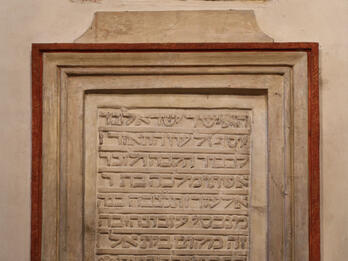Commentary: On Psalms
Psalm 14
For the leader. A psalm of David. The fool said in his heart there is no God . . . (Psalms 14:1–2).
Now [the psalmist] declares the reasoning of the fool, and what argument he has supporting his understanding of this worthless view. Afterwards he advances three arguments to prove that the fool’s reasoning is completely erroneous. To this end, he cites the evil view that the fool declares, “there is no God,” that is to say, there is no providential supervisor to smite the evil doer in accord with his wickedness, and similarly there is no supervisor to bestow good reward on one who does good. There is none that does good (Psalms 14:1) means: there is no God who exercises providence on those who do good.
[The psalmist] says that the reason why the fool adopts this reasoning is that he says that he sees that The Lord [may He be blessed!] looks down from heaven (Psalms 14:2)—from the aspect of the patterns of the stars; there is no intention of reward for one who does good, nor of punishment to punish one who does evil, only that one who is enlightened and knows how to calculate those patterns can be on guard against them. If so, there is no intention that is examined in view of one who does good and evil. The fool therefore decides against such providence, and this is what he says: All have turned bad, altogether foul [there is none who does good] (Psalms 14:3). This refers to the question of one exercising providence to the doer of good, to which he says, “there is not even one.” This means, even if you see a person who does good, he receives providence not by virtue of his doing good, but only accidentally.
To this, the psalmist poses three counter-arguments. The first is contained in what he says: Are they so ignorant . . . (Psalms 14:4). He argues here against the fool, saying that the evil doers know of themselves that they devour my people as they devour bread [alt. “food”], and this at a time that they do not invoke the Lord (Psalms 14:4). The deeper argument here lies in the similarity between eating bread and the way in which they were victorious—not in the normal manner of the world, but rather one routing a thousand and two pursuing ten-thousand (Deuteronomy 32:30). No constellation or planet can compel this. If so, it would seem that their Rock delivered them (Deuteronomy 32:30). The psalmist here argues: You, the fool, ought to bring proof from how the evil-doers devour My people as one eats bread, which undoubtedly points to special providence.
The second argument is from verse 5: There they will be seized with fright (Psalms 14:5). It appears that you, too, O fool, ought to bring argument from the fact that the evil-doers devour my people as they devour bread. For the evil-doers, too, know that since they eat my people in the way that they devour bread, they are seized with fright, saying, maybe [the Israelites] will repent. This is the meaning of verse 5: For God is present in the generation of the righteous. Or at that time they will be afraid of touching them. Indeed, this demonstrates that it is all the providence of the Lord (may He be blessed!).
He offers a third argument, saying: You may disparage the counsel of the lowly, but the Lord is his refuge (Psalms 14:6). This means: What counsel does the lowly in need take? That he should take shelter in the counsel of his God (may He be blessed!), who will fulfill his requests. But you disparage this counsel! And this is the opposite of common opinion, that the salvation of Israel comes from Zion, and then all iniquity will shut its mouth, because then they will know the actions of God are the opposite of His nature. Therefore David (peace be his!) prayed that the fool’s mouth be shut, and said: O that [the deliverance of Israel might come] from Zion (Psalms 14:7). For then the multitude of the people will rejoice. This is hinted at there by saying that Jacob will exult, even though the remnant of the righteous, called by the name Israel, will rejoice (Psalms 14:7). He takes Jacob as indicating “exultation,” which is a word indicating rejoicing in the plural. Why? Because they rank low in that trait, as if they are doubtful whether they will see the good of the Lord (Psalms 27:13). But the pious who are already sure will only rejoice upon realizing this.
Credits
Published in: The Posen Library of Jewish Culture and Civilization, vol. 5.




